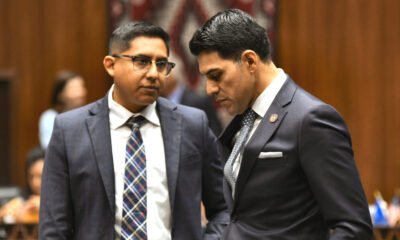arizona
Project 2025 Threatens Student Loans for Undocumented Immigrants in Arizona and Beyond

Arizona remains one of the 25 states allowing in-state tuition for undocumented students. However, proposed changes under a policy framework favored by President-elect Donald Trump could jeopardize federal student loans for 67,000 undergraduates in the state, most of whom are U.S. citizens.
This initiative, part of a wider strategy to pressure undocumented immigrants, could have far-reaching implications for students attending Arizona State University, the University of Arizona, and Northern Arizona University, where approximately one-third of the student body depends on federal loans.
Jenny Muñiz, a senior policy advisor with UnidosUS, expressed concern over the collective impact of such policies, stating, “This particular attack is intended to really bully and affect a small group… any attempt to restrict federal financial aid would have ripple effects on all students.”
House Education Chair Rep. Virginia Foxx supports this stance, condemning the use of resources for undocumented students at the expense of legal U.S. citizens. Her comments were made in a statement shared by aides, highlighting strong partisan divisions on education funding.
The proposal stems from Project 2025, a policy outline developed by the conservative Heritage Foundation, and features input from former Trump administration officials, including Russell Vought and Ken Cuccinelli, the latter focusing on issues like student loans and tuition policies for immigrant students.
Notably, ASU junior Connor Greenwall weighed in, noting that federal loans cover about 40% of his tuition. “If I was not getting any federal student loan assistance, it would be impossible for me to attend college,” he remarked, reflecting the sentiments of many affected students.
Skepticism surrounds the incoming administration’s commitment to more inclusive policies. Critics worry that the Department of Education and other federal agencies may become even less supportive of immigrant students than they were previously. This apprehension extends to Sen. Bill Cassidy, who has yet to announce his position but previously took a hardline stance on immigration and education policies.
Since Proposition 308 was approved by Arizona voters in 2021, the landscape has shifted. Although it garnered mixed support, it established in-state tuition for undocumented students who met specific educational criteria. Approximately 1,000 undocumented students graduate from Arizona high schools annually, with a reported 9,500 currently enrolled in public colleges in Arizona.
Experts warn that eliminating federal loans could severely disrupt higher education across the state. Katherine Meyer from the Brookings Institution emphasized that such policies would undermine the stability of educational institutions and deter students from pursuing their degrees.
Proponents of student aid argue that disconnecting federal funding could inadvertently deepen divisions between U.S. citizens and their undocumented peers. Raymond Serrano, from the League of United Latin American Citizens, noted a potential rift as U.S. citizens could perceive undocumented students as threats to their financial welfare.
As legislative and administrative battles loom over student aid and immigration policy, advocacy groups are preparing to challenge any restrictive measures. “We’re just really prepared to collaborate with legal advocacy groups to mount any of those challenges,” remarked Monica Andrade of the Presidents’ Alliance on Higher Education and Immigration, signaling a robust defense effort against potential policy shifts.

















